In this exciting blog post, two young, talented cross-country skiers share their experiences with Somnofy, an advanced sleep monitor that has contributed to enhancing their performance and well-being. Julie and Solveig provide insights into how Somnofy has transformed their sleep routines, the benefits they have experienced, and how they have learned to understand and leverage their own sleep quality. Additionally, they share their personal sleep advice and tips to maximize both sleep and performance. Join their journey and discover how sleep can be the key to success for athletes. We at VitalThings are cheering for you!
By Julie Hammer and Solveig Lie Støverud
Why were we curious about Somnofy?
As aspiring cross-country skiers, we have always been very interested and curious about acquiring new knowledge that can make us even better athletes. If there's one thing we've learned, it's that training and health must always be viewed from a holistic perspective, and sleep is a particularly crucial factor. After learning more about sleep in the past year, we realized how much there is to gain. Our sleep is intricately connected to our health! We have always had a desire to learn because we understand the significance of knowledge. That's why it was especially exciting for us at the beginning of this year's ski season to have the opportunity to start testing Somnofy, the world's most precise contactless sleep and breathing monitor.
Simplicity and Insight: Our Experience with Somnofy and the App
It has been incredibly exciting and, not least, educational to gain insight into so much data related to our own sleep. Using Somnofy is super easy; it sits on the nightstand and starts collecting data as soon as we go to bed. The device is connected to WIFI, and the data is transferred automatically. Additionally, it's easy to take with us when traveling. The app provides a very clear overview of all the data collected from the previous night and allows us to compare it with previous nights. This makes it easier for us to interpret the data in terms of our own normal sleep patterns. Previously, we monitored our sleep using heart rate monitors, but the data we have access to now is both more accurate and, notably, more detailed. Particularly, the insight into our breathing patterns has been very valuable.

The Role of Breathing in Training Adjustments: Lessons from the Breath Curve
Unlike when we are awake, our breathing is entirely controlled by the autonomic nervous system when we sleep, meaning we breathe completely unconsciously. This provides us with a unique way to interpret the body's status through our respiratory rate. Somnofy measures breathing throughout the night, and the respiratory rate Somnofy measures can be trusted 100%. Respiratory rate is a measure of the number of breaths per minute and is a useful tool to assess whether the body is in balance. While respiratory rate varies from person to person, it usually remains relatively stable over longer periods but can fluctuate during infections, inflammations, and similar conditions. As athletes, we depend on our bodies being in balance to absorb training, recover, and, most importantly, perform. Somnofy can alert us to illness before symptoms arise, providing an opportunity for preventive measures, such as adjusting the training load for a day or two to avoid disruptions due to illness. It is also common for respiratory rate to increase after a strenuous exercise. This is something we have experienced several times. Following intense race weekends or other demanding training periods, we have observed an increase in respiratory rate. After a couple of days of lighter training, the respiratory rate decreases, and the body is ready to absorb training again. This adds an extra layer of confidence to our daily routine.
Sleep and Performance: Is there a Connection?
Many can probably relate to experiencing slightly poorer sleep leading up to important events, as we often do before ski races. There is no doubt that one can have an outstanding ski race without getting a perfect night's sleep. However, consistent insufficient sleep over time can pose challenges. It makes the body more susceptible to illness and may jeopardize the body's ability to absorb training. We believe that continuity and consistent training efforts over time, with high-quality sessions, are key to development. For us, these sessions are characterized by presence, proper focus, and here, too, sleep plays a crucial role. Just as little as one hour less sleep can significantly impact our focus the following day. In fact, not a single organ in the body or any of the brain's functions are not improved by good sleep or weakened when we sleep too little.


Sleep Routines in a New Way: How Somnofy Has Changed Our Habits
Good sleep is characterized not only by the length of sleep but also by the quality of sleep. We typically sleep between 8 and 9 hours, and since we started using Somnofy, we have become more aware of the various factors that contribute to improving sleep quality, such as increasing the amount of deep sleep. The subjective experience of the quality of our sleep is not always the same as the objective one, and this is where Somnofy is helpful. By regularly monitoring sleep data, we have gradually learned what contributes to good or poor sleep quality.
Somnofy measures temperature, humidity, and air quality. This has taught us the importance, for example, of ventilating the room every night. In addition, it provides a very accurate bedtime, and here we have experimented to bring the average down. For us, it has proven to be important to regulate light before bedtime and reduce screen time (especially in the last hours before sleep). This has, among other things, motivated us not to bring our phones into the bedroom. Another interesting insight we have gained is that large meals close to bedtime do not necessarily prolong the time it takes to fall asleep but can have a significant negative impact on the proportion of deep sleep!
Our Sleep Tips for Better Performance: Personal Recommendations
- Wind down in the last hour before bedtime. For example, we like to read a book and dim the lights. We have both experienced a considerable reduction in the time it takes to fall asleep when doing this.
- Avoid eating a large meal too close to bedtime. This almost always leads to less deep sleep.
- Go to bed at approximately the same time every day. Humans are creatures of habit and not very good at adapting to new sleep patterns.
- Go to bed early enough. The deep sleep mainly occurs before midnight.
- Few people fall asleep as soon as they go to bed. Therefore, allocate more time for sleep than the exact number of hours you need.
- Do not prioritize exercise if you do not have time to prioritize sleep.
- Read 'Why We Sleep' by Matthew Walker for a mind-blowing reading experience and a much better understanding of the importance of sleep. You can also read about sleep on Somnofy's website. Most people know that sleep is important, but far fewer know why.

